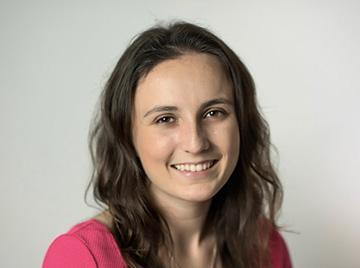Hayley Raquer ’16: The Biology Department’s Case Study in Excellence

“This is how things work—this is how WE work!”
Aha moments have a way of presenting themselves with all caps and exclamation marks, and biology major Hayley Raquer’s moment was no different. While sitting in Dr. Christelle Sabatier’s Introduction to Physiology class as a first-year student at Santa Clara, hearing how molecules travel across cell membranes, Hayley knew instinctively that her early plans to go to law school were moving aside for a future in biology research.
Now, after four years on campus and graduation on the horizon, it is clear she was right to trust her gut. In fact, her response when asked what she expects to miss the most as she moves on says it all: “It will be the little things—like working in the labs during summer, when I can stay there from 9-5… or 7-5 some days.”
As far as passion for research and time in the lab go, she still has plenty to look forward to. Because of her academic success at Santa Clara, Hayley has been awarded a fellowship with the National Institutes of Health, part of the U.S. Department of Health and Human Services and the largest biomedical research agency in the world. The fellowship will have her spending the next two years on the outskirts of Washington D.C., conducting research alongside a mentor within the National Institutes of Allergy and Infectious Diseases.
From there, Hayley plans to pursue her Ph.D. in molecular biology or immunology and specialize in the research of autoimmune diseases. “I am fascinated with the new immunotherapy and bioengineering studies… I want to be able to tailor an individual’s own immune defenses to fight specific diseases and illness,” she explains.
Part of Hayley’s drive comes from her enthusiasm for each aspect of the scientific process – conducting experiments, collecting data, convincing others of the relevance of the data, and coming up with strategies to resolve the issue – and part of it is personal.
The personal part comes from her sense of compassion for people who are suffering because she knows firsthand how it feels to hear a doctor say, “This is all we can do.” She gained this empathy from her experience with endometriosis, a painful disorder in which tissue that normally lines the inside of the uterus grows outside and affects the ovaries, resulting in scarring that can also cause fertility issues. With limited funding for research on this disorder that affects her, Hayley understands the frustration of people who suffer from any disease not deemed a priority for research funding, and she wants to help make a difference.
This desire to help humankind is also what made her want to come to Santa Clara moments after stepping on campus. “I felt like the theme of social justice radiated from this campus. Everyone was so proud and excited to be here. Not in a rah-rah sense but for a purpose—to help other people,” Hayley describes.
Her time here has been full and richly rewarding, with opportunities and accolades aplenty. She won’t even play the game of crediting one professor who has been the most impactful, insisting that every single faculty member in biology has shaped her personally and academically. To name a few, she credits Dr. Leilani Miller, who believed in her abilities when she doubted herself; Dr. Tracy Ruscetti, who opened her eyes to immunology and always took time to listen and encourage her enthusiasm for research; and Dr. Katy Korsmeyer, who worked to find mentors who could normalize the experience of women in research for her.
With the inspiration and guidance of these faculty members, Hayley founded the Women in STEM club on campus that has grown from 10 members in 2014 to 150 in the two years since its inception. Her goal was to expand the influence of women mentors in science and technology so that her classmates would experience what Dr. Korsmeyer did for her.
So Hayley did what she does best—research. She started asking her male peers who the women were in their labs and classes and then “cold” emailed them to see if they wanted to get involved. The rest, as they say, is history. As Hayley graduates and prepares to hand the group’s leadership to the next generation of women leaders in science and technology on campus, the group bustles with visits from industry guest speakers who are enthusiastic about mentoring future female leaders in STEM.
Hayley’s efforts in the classroom, in the lab, and in club leadership have made her the obvious choice for a variety of awards, but this year’s Gerald and Sally DeNardo Senior Prize in Science Research feels extra special to her because it was awarded to her in the presence of many of the faculty members who helped her achieve it.
A close second may just be the presentation of the Saint Clare Medal, which she will be receiving this week as the female graduate judged outstanding in academic performance, personal character, school activities, and constructive contribution to the University by the faculty and the provost.